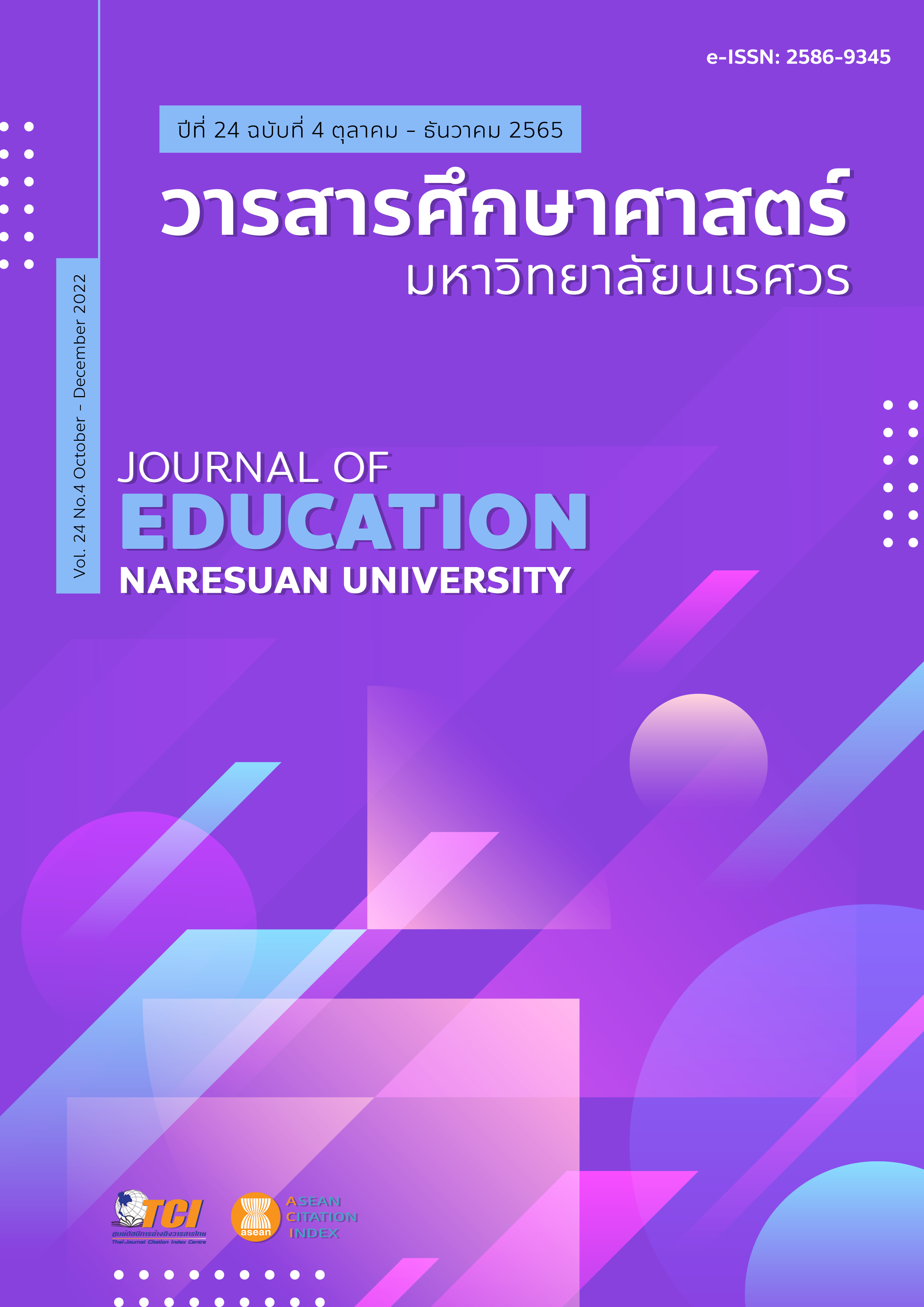EFFECT OF A FLIPPED LEARNING WITH PROBLEM-BASED LEARNING AND GAMIFICATIONS TO ENHANCE COMPUTATIONAL THINKING AND ACHIEVEMENT MOTIVATION OF UPPER SECONDARY SCHOOL STUDENTS ผลการจัดการเรียนรู้โดยใช้รูปแบบการเรียนกลับด้านร่วมกับการเรียนโดยใช้ปัญหาเป็นฐานและเกมิฟิเคชัน เพื่อส่งเสริมการคิดเชิงคำนวณและแรงจูงใจใฝ่สัมฤทธิ์ของนักเรียนมัธยมศึกษาตอนปลาย
Main Article Content
Abstract
The purpose of this research were 1) compare the effect of a flipped learning with problem-based learning and gamifications to enhance computational and achievement motivation, 2) to compare achievement motivation of students using a flipped learning with problem-based learning and gamifications. The samples were 40 tenth grade students of Rittiyawannalai School by 7 weeks of teaching. The experimental instruments were learning website and lesson plan. The data collection instruments comprised: computational thinking test, an achievement motivation test, and student’s satisfaction towards the model test questionnaire. The data were analyzed by using mean, standard deviation and t-test. The research results were as follows: the experimental result indicated that the subjects had computational thinking post-test mean scores higher than pre-test at .05 level of significance and achievement motivation post-test mean scores higher than pre-test at .05 level of significance.
Article Details

This work is licensed under a Creative Commons Attribution-NonCommercial-NoDerivatives 4.0 International License.
The owner of the article does not copy or violate any of its copyright. If any copyright infringement occurs or prosecution, in any case, the Editorial Board is not involved in all the rights to the owner of the article to be performed.
References
Barrow, H. S. (2000). Problem-based learning applied to medical education. Illinois: School of Medicine, Southern Illinois University.
Chumwangwapee, T., & Silanoi, L. (2015). The development of grade 7 students’ learning achievement and problem solving skill in the social studies S21103 Course using problem – based leaning approach together with Flipped Classroom Technique. Journal of Education Khon Kaen University, 38(4), 7-14. [in Thai]
Daungjun, S. (2018). Effects of using STEM education in physics on computational thinking ability of upper secondary school. Bangkok: Faculty of Education, Chulalongkorn University. [in Thai]
Kachka, P. (2012). Educator’s voice: What’s all this talk about flipping. Retrieved from https://tippie.uiowa.edu/faculty-staff/allcollege/kachka.pdf
Kapp, K. M. (2012). The gamification of learning and instruction: Game-based methods and strategies for training and education. San Francisco, CA.: Pfeiffer.
Ketkhamkhwa, S. (2019). Results of using computer multimedia lesson based to computational thinking format entitled condition function and loop function for matthayomsuksa 4 students. Journal of Educational Technology and Communications Faculty of Education Mahasarakham University, 2(5), 86-95. [in Thai]
Khemmani, T. (2018). Science teaching: Knowledge for the learning process effective (22nd ed). Bangkok: Chulalongkorn University Press. [in Thai]
Panich, V. (2013). Teacher for pupils create flipped classroom (3th ed). Bangkok: S.R. Printing Mas Product. [in Thai]
Poondej, C., & Lerdpornkulrat, T. (2016). Learning management with the gamification concept. Journal of Education Naresuan University, 18(3), 331-339. [in Thai]
Rattanawongsa, R. (2016). Development of an instructional model in gamified learning environment with design-based learning and visual tools to enhance visual literacy and achievement motivation for undergraduate students. Bangkok: Faculty of Education, Chulalongkorn University. [in Thai]
Saengduangdee, V. (2014). Development of a blended instructional model using problem-based learning approach and critical thinking approach to enhance ethical decision-making ability in journalistic profession. Bangkok: Faculty of Education, Chulalongkorn University. [in Thai]
Savery., J. R. (2006). Overview of problem-based learning: Definitions and distinctions. Interdisciplinary Journal of Problem-Based Learning, 1(1), 9-20.
Songkhram, C., Klineam, C., & Supap, W. (2020). The development of computational thinking by using the problem-based learning in probability for grade 10th students. Silpakorn Education Research Journal, 12(1), 202-216. [in Thai]
Supaluk, S. (2018). A cloud based learning system using reverse engineering approach and peer to peer technique to enhance computational thinking. Bangkok: Faculty of Education, Chulalongkorn University. [in Thai]
Suwannoi, P. (2016). Problem–based learning: PBL. Retrieved October 19, 2019 from https://ph.kku.ac.th/thai/images/file/km/pbl-he-58-1.pdf [in Thai]
Suwanvapee, P., & Kanjug, I. (2020). The development gamification learning environment to enhance problem solving thinking in computing science courses on topic problem solving for grade 7 students, Nongwuasorpittayakhom School. Journal of Graduate Research Chiang Mai Rajabhat University, 11(1), 15-27. [in Thai]
Wing, J. M. (2006). Computational thinking. Communications of the ACM, 49(3), 33-35.
Zamzami, Z. (2018). Students' learning performance and perceived motivation in gamified flipped-class instruction. Hong Kong: Faculty of Education, The University of Hong Kong.


